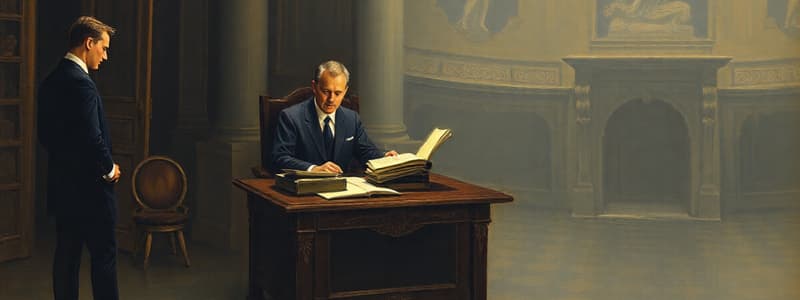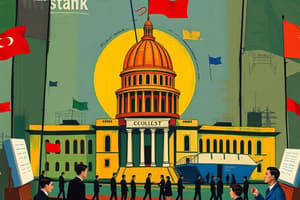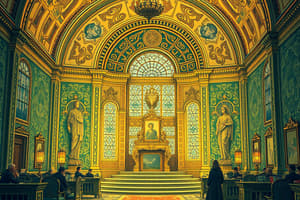Podcast
Questions and Answers
What is a characteristic of the rulemaking process within bureaucratic agencies?
What is a characteristic of the rulemaking process within bureaucratic agencies?
- Rules can only be proposed by Congress.
- The rulemaking process is entirely unregulated.
- Rules are enforced only at the state level.
- Agencies create rules that have the force of law. (correct)
Which of the following tools can the President use to maintain control over the bureaucracy?
Which of the following tools can the President use to maintain control over the bureaucracy?
- Direct appointment and removal of agency heads. (correct)
- Veto power over agency budget proposals.
- Creation of new bureaucratic agencies without support.
- Immediate policy implementation without any oversight.
What is an example of police patrol oversight?
What is an example of police patrol oversight?
- Legislators only responding to public outcry.
- Annual reports submitted by agencies without review.
- Proactive audits of agency performance. (correct)
- Waiting for citizens to complain about agency failures.
Which system of hiring emphasizes qualifications and performance for government positions?
Which system of hiring emphasizes qualifications and performance for government positions?
What occurs during agency capture?
What occurs during agency capture?
Which statement accurately describes the concept of rulemaking in bureaucratic agencies?
Which statement accurately describes the concept of rulemaking in bureaucratic agencies?
What is the main difference between police patrol oversight and fire-alarm oversight?
What is the main difference between police patrol oversight and fire-alarm oversight?
Which system of hiring is most likely to emphasize political loyalty over qualifications?
Which system of hiring is most likely to emphasize political loyalty over qualifications?
Which of the following accurately describes the implications of contracting out government work?
Which of the following accurately describes the implications of contracting out government work?
Which situation represents an example of agency capture?
Which situation represents an example of agency capture?
Which of the following accurately defines an 'Iron Triangle' in the context of bureaucratic agencies?
Which of the following accurately defines an 'Iron Triangle' in the context of bureaucratic agencies?
Flashcards are hidden until you start studying
Study Notes
Rulemaking
- A "rule" is a regulation or a set of guidelines that an agency creates to implement and enforce a law.
- These rules have the force of law and apply to the public.
Bureaucratic Authority
- Bureaucratic agencies implement and enforce laws.
- They are responsible for providing services and collecting information.
- Although agencies have the authority to create rules, they cannot make laws, declare wars, or interpret the constitution.
- The agency's scope of authority originates from the constitution and laws passed by Congress.
Presidential Control of Bureaucracy
- The President appoints agency heads and uses executive orders to direct agency actions.
- Presidents can influence the budget process to favor certain agencies and priorities.
- The Office of Management and Budget helps the president control the bureaucracy.
Monitoring the Bureaucracy
- Police patrol oversight involves constant, systematic monitoring of agency actions to ensure compliance.
- Fire-alarm oversight relies on external actors (like interest groups or the media) to bring attention to wrongdoing by an agency.
Agency Capture
- Agency Capture occurs when an agency is heavily influenced by the industry it is meant to regulate.
- The agency may prioritize the interests of the industry over public interests.
The Bureaucracy and its Structure
- The bureaucracy is the non-elected government officials who carry out the day-to-day responsibilities of government.
- The merit system is a hiring system based on qualifications and experience. It aims to promote neutrality and reduce the influence of political patronage.
- Spoils System is a hiring system based on political loyalty. It can lead to unqualified personnel and corruption.
- Contracting out government work can be beneficial by improving efficiency and reducing costs.
- However, it can also lead to a loss of government control and accountability.
Cabinet Departments vs. Other Bureaucratic Agencies
- Cabinet departments are the largest and most influential agencies, headed by a secretary who is appointed by the president and confirmed by the Senate.
- Independent executive agencies report directly to the President, but are not part of the cabinet.
- Independent regulatory commissions are designed to be insulated from political influence and have more autonomy in making rules.
Iron Triangles
- Iron Triangles are informal alliances between congressional committees, government agencies, and interest groups that work together to advance a particular policy agenda.
- They can influence policy decisions in areas like defense, agriculture, and transportation.
Rulemaking
- A rule is a regulation that clarifies the law passed by Congress
- Rules are used to translate broad legislation into specific actions
Bureaucracy Authority
- Agencies have the power to enact regulations to administer law
- Agencies cannot pass legislation, declare war, or interpret the constitution
- The president is the head of the federal bureaucracy
- Presidents have the power to appoint agency heads
Presidential Control of the Bureaucracy
- Appointing heads of the bureaucracy and other key positions
- Issuing executive orders
- Controlling the budget
- Using the media to influence public opinion
Bureaucracy Monitoring
- Police Patrol Oversight: Regularly scrutinizing agencies to ensure they’re following laws - Example: Congressional oversight committees monitoring agency activity
- Fire-Alarm Oversight: Responding to complaints or problems with agency actions - Example: A citizen filing a lawsuit against an agency for violating their rights
Agency Capture
- When an agency acts more on the behalf of a special interest group over the public
The Bureaucracy
- Consists of unelected officials organized into departments, agencies, and bureaus
- It is run by the executive branch of the federal government
Hiring Systems
- Merit System: Hiring based on qualifications and exams - This led to a more professional and qualified bureaucracy
- Spoils System: Hiring based on political connections - This led to a less skilled and less efficient bureaucracy
Contracting Out
- Benefits: Can be more efficient and cost-effective
- Harms: Can lead to corruption and a loss of government control
Cabinet Departments vs. Other Agencies
- Cabinet departments report directly to the President and have broader responsibilities (e.g., Department of Education)
- Other agencies may report to a cabinet department or directly to the President (e.g., Environmental Protection Agency)
Iron Triangles
- A close relationship between an agency, a congressional committee, and an interest group working together to benefit each other
- Example: The Department of Agriculture, the House Agriculture Committee, and the American Farm Bureau Federation
Studying That Suits You
Use AI to generate personalized quizzes and flashcards to suit your learning preferences.




